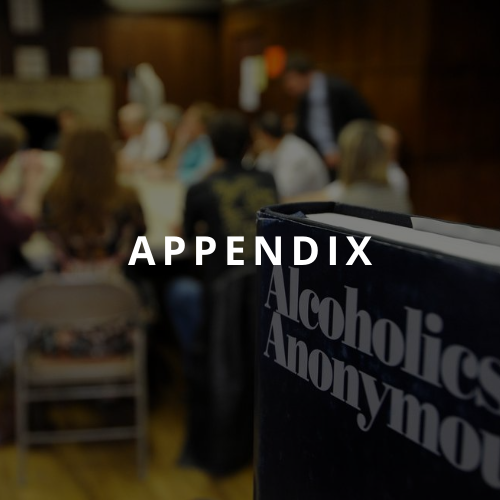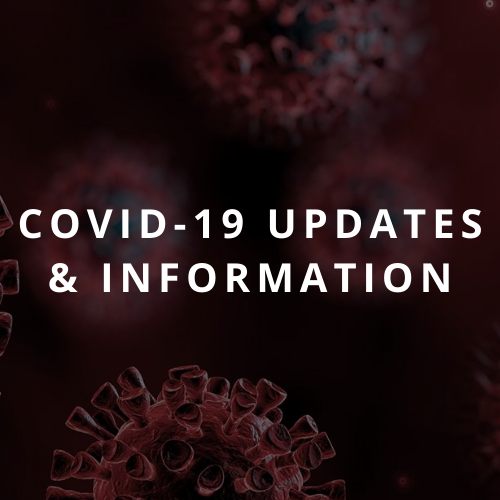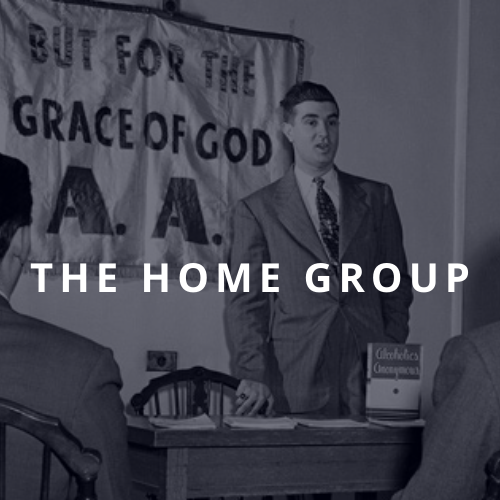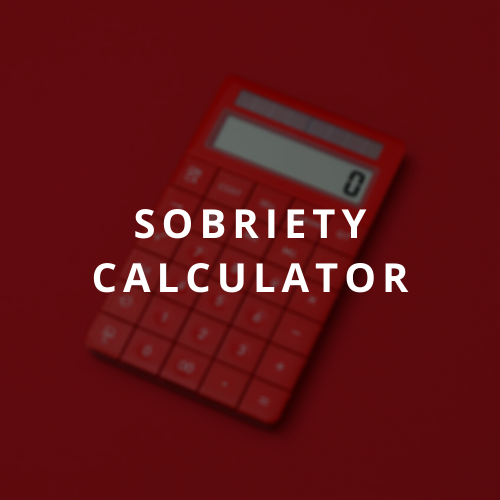APPENDIX
I. The A.A. Tradition II. Spiritual Experience III. The Medical View on A.A. IV. The Lasker Award V. The Religious View on A.A. VI. How to Get in Touch With A.A.
I. THE A.A. TRADITION
To those now in its fold, Alcoholics Anonymous has made the difference between misery and sobriety, and often the difference between life and death. A.A. can, of course, mean just as much to uncounted alcoholics not yet reached. Therefore, no society of men and women ever had a more urgent NEED for continuous effectiveness and permanent unity. We alcoholics see that we must work together and hang together, else most of us will finally die alone. The “12 Traditions” of Alcoholics Anonymous are, we A.A.’s believe, the best answers that our experience has yet given to those ever urgent questions, “How can A.A. best function?” and, “How can A.A. best stay whole and so survive?” On the next page, A.A.’s “12 Traditions” are seen in their so-called “short form,” the form in general use today. This is a condensed version of the original “long form” A.A. Traditions as first printed in 1946. Because the “long form” is more explicit and of possible historic value, it is also reproduced. One–Our common welfare should come first; personal recovery depends upon A.A. unity. Two–For our group purpose there is but one ultimate authority–a loving God as He may express Himself in our group conscience. Our leaders are but trusted servants; they do not govern. Three–The only requirement for A.A. membership is a desire to stop drinking. Four–Each group should be autonomous except in matters affecting other groups, or A.A. as a whole. Five–Each group has but one primary purpose–to carry its message to the alcoholic who still suffers. Six–An A.A. group ought never endorse, finance or lend the A.A. name to any related facility or outside enterprise; lest problems of money, property and prestige divert us from our primary purpose. Seven–Every A.A. group ought to be fully self-supporting, declining outside contributions. Eight–Alcoholics Anonymous should remain forever nonprofessional, but our service centers may employ special workers. Nine–A.A., as such, ought never be organized; but we may create service boards or committees directly responsible to those they serve. Ten–Alcoholics Anonymous has no opinion on outside issues; hence the A.A. name ought never be drawn into public controversy. Eleven–Our public relations policy is based upon attraction rather than promotion; we need always maintain personal anonymity at the level of press, radio and films. Twelve–Anonymity is the spiritual foundation of all our Traditions, ever reminding us to place principles before personalities.
The Twelve Traditions (The Long Form)
Our A.A. experience has taught us that: 1.–Each member of Alcoholics Anonymous is but a small part of a great whole. A.A. must continue to live or most of us will surely die. Hence our common welfare comes first. But individual welfare follows close afterward. 2.–For our group purpose there is but one ultimate authority–a loving God as He may express Himself in our group conscience. 3.–Our membership ought to include all who suffer from alcoholism. Hence we may refuse none who wish to recover. Nor ought A.A. membership ever depend upon money or conformity. Any two or three alcoholics gathered together for sobriety may call themselves an A.A. Group, provided that, as a group, they have no other affiliation. 4.–With respect to its own affairs, each A.A. group should be responsible to no other authority than its own conscience. But when its plans concern the welfare of neighboring groups also, those groups ought to be consulted. And no group, regional committee, or individual should ever take any action that might greatly affect A.A. as a whole without conferring with the Trustees of the General Service Board. On such issues our common welfare is paramount. 5.–Each Alcoholics Anonymous group ought to be a spiritual entity HAVING BUT ONE PRIMARY PURPOSE–that of carrying its message to the alcoholic who still suffers. 6.–Problems of money, property, and authority may easily divert us from our primary spiritual aim. We think, therefore, that any considerable property of genuine use to A.A. should be separately incorporated and managed, thus dividing the material from the spiritual. An A.A. group, as such, should never go into business. Secondary aids to A.A., such as clubs or hospitals which require much property or administration, ought to be incorporated and so set apart that, if necessary, they can be freely discarded by the groups. Hence such facilities ought not to use the A.A. name. Their management should be the sole responsibility of those people who financially support them. For clubs, A.A. managers are usually preferred. But hospitals, as well as other places of recuperation, ought to be well outside A.A.–and medically supervised. While an A.A. group may cooperate with anyone, such cooperation ought never go so far as affiliation or endorsement, actual or implied. An A.A. group can bind itself to no one. 7.–The A.A. group themselves ought to be full supported by the voluntary contributions of their own members. We think that each group should soon achieve this ideal; that any public solicitation of funds using the name of Alcoholics Anonymous is highly dangerous, whether by groups, clubs, hospitals, or other outside agencies; that acceptance of large gifts from any source, or of contributions carrying any obligation whatever, is unwise. Then too, we view with much concern those A.A. treasuries which continue, beyond prudent reserves, to accumulate funds for no stated A.A. purpose. Experience has often warned us that nothing can so surely destroy our spiritual heritage as futile disputes over property, money, and authority. 8.–Alcoholics Anonymous should remain forever non-professional. We define professionalism as the occupation of counseling alcoholics for fees or hire. But we may employ alcoholics where they are going to perform those services for which we might otherwise have to engage non-alcoholics. Such special services may be well recompensed. But our usual A.A. “12th Step” work is never to be paid for. 9.–Each A.A. groups needs the least possible organization. Rotating leadership is the best. The small group may elect its Secretary, the large group its Rotating Committee, and the groups of a large Metropolitan area their Central or Intergroup Committee, which often employs a full-time Secretary. The trustees of the General Service Board are, in effect, our A.A. General Service Committee. They are the custodians of our A.A. Tradition and the receivers of voluntary A.A. contributions by which we maintain our A.A. General Service Office at New York. They are authorized by the groups to handle our over-all public relations and they guarantee the integrity of our principle newspaper, “The A.A. Grapevine.” All such representatives are to be guided in the spirit of service, for true leaders in A.A. are but trusted and experienced servants of the whole. They derive no real authority from their titles; they do not govern. Universal respect is the key to their usefulness. 10.–No A.A. group or member should ever, in such a way as to implicate A.A., express any opinion on outside controversial issues–particularly those of politics, alcohol reform, or sectarian religion. The Alcoholics Anonymous groups oppose no one. Concerning such matters they can express no views whatever. 11.–Our relations with the general public should be characterized by personal anonymity. We think A.A. ought to avoid sensational advertising. Our names and pictures as A.A. members ought not be broadcast, filmed, or publicly printed. Our public relations should be guided by the principle of attraction rather than promotion. There is never need to praise ourselves. We feel it better to let our friends recommend us. 12.–And finally, we of Alcoholics Anonymous believe that the principle of Anonymity has an immense spiritual significance. It reminds us that we are to place principles before personalities; that we are actually to practice a genuine humility. This to the end that our great blessings may never spoil us; that we shall forever live in thankful contemplation of Him who presides over us all.
II. SPIRITUAL EXPERIENCE
The terms “spiritual experience” and “spiritual awakening” are used many times in this book which, upon careful reading, shows that the personality change sufficient to bring about recovery from alcoholism has manifested itself among us in many different forms. Yet it is true that our first printing gave many readers the impression that these personality changes, or religious experiences, must be in the nature of sudden and spectacular upheavals. Happily for everyone, this conclusion is erroneous. In the first few chapters a number of sudden revolutionary changes are described. Though it was not our intention to create such an impression, many alcoholics have nevertheless concluded that in order to recover they must acquire an immediate and overwhelming “God-consciousness” followed at once by a vast change in feeling and outlook. Among our rapidly growing membership of thousands of alcoholics such transformations, though frequent, are by no means the rule. Most of our experiences are what the psychologist William James calls the “educational variety” because they develop slowly over a period of time. Quite often friends of the newcomer are aware of the difference long before he is himself. He finally realizes that he has undergone a profound alteration in his reaction to life; that such a change could hardly have been brought about by himself alone. What often takes place in a few months could hardly be accomplished by years of self-discipline. With few exceptions our members find that they have tapped an unsuspected inner resource which they presently identify with their own conception of a Power greater than themselves. Most of us think this awareness of a Power greater than ourselves is the essence of spiritual experience. Our more religious members call it “God-consciousness.” Most emphatically we wish to say that any alcoholic capable of honestly facing his problems in the light of our experience can recover, provided he does not close his mind to all spiritual principles. He can only be defeated by an attitude of intolerance or belligerent denial. We find that no one need have difficulty with the spirituality of the program. WILLINGNESS, HONESTY AND OPEN MINDEDNESS ARE THE ESSENTIALS OF RECOVERY. BUT THESE ARE INDISPENSABLE. “There is a principle which is a bar against all information, which is proof against all arguments and which cannot fail to keep a man in everlasting ignorance–that principle is contempt prior to investigation.” –HERBERT SPENCER
III. THE MEDICAL VIEW ON A.A
Since Dr. Silkworth’s first endorsement of Alcoholics Anonymous, medical societies and physicians throughout the world have set their approval upon us. Following are excerpts from the comments of doctors present at the actual meeting* of the Medical Society of the State of New York where a paper on A.A. was read: Dr. Foster Kennedy, neurologist: “This organization of Alcoholics Anonymous calls on two of the greatest reservoirs of power known to man, religion and that instinct for association with one’s fellows…the ‘herd instinct.’ I think our profession must take appreciative cognizance of this great therapeutic weapon. If we do not do so, we shall stand convicted of emotional sterility and of having lost the faith that moves mountains, without which medicine can do little.” Dr. G. Kirby Collier, psychiatrist: “I have felt that A.A. is a group unto themselves and their best results can be had under their own guidance, as a result of their philosophy. Any therapeutic or philosophic procedure which can prove a recovery rate of 50% to 60% must merit our consideration.” Dr. Harry M. Tiebout, psychiatrist: “As a psychiatrist, I have thought a great deal about the relationship of my speciality to A.A. and I have come to the conclusion that our particular function can very often lie in preparing the way for the patient to accept any sort of treatment or outside help. I now conceive the psychiatrist’s job to be the task of breaking down the patient’s inner resistance so that which is inside him will flower, as under the activity of the A.A. program.” * 1944 Dr. W. W. Bauer, broadcasting under the auspices of The American Medical Association in 1946, over the NBC network, said, in part: “Alcoholics Anonymous are no crusaders; not a temperance society. They know that they must never drink. They help others with similar problems… In this atmosphere the alcoholic often overcomes his excessive concentration upon himself. Learning to depend upon a higher power and absorb himself in his work with other alcoholics, he remains sober day by day. The days add up into weeks, the weeks into months and years.” Dr. John F. Stouffer, Chief Psychiatrist, Philadelphia General Hospital, citing his experience with A.A., said: “The alcoholics we get here at Philadelphia General are mostly those who cannot afford private treatment, and A.A. is by far the greatest thing we have been able to offer them. Even among those who occasionally land back in here again, we observe a profound change in personality. You would hardly recognize them.” The American Psychiatric Association requested, in 1949, that a paper he prepared by one of the older members of Alcoholics Anonymous to be read at the Association’s annual meeting of that year. This was done, and the paper was printed in the American Journal of Psychiatry for November, 1949. (This address is now available in pamphlet form at nominal cost through most A.A. groups or from Box 459, Grand Central Station, New York, NY 10163, under the title “Three Talks to Medical Societies by Bill W.”– formerly called “Bill on Alcoholism” and earlier “Alcoholism the Illness.”)
IV. THE LASKER AWARD
In 1951 the Lasker Award was given Alcoholics Anonymous. The citation reads in part as follows: “The American Public Health Association presents a Lasker Group Award 1951 to Alcoholics Anonymous in recognition of its unique and highly successful approach to that age-old public health and social problem, alcoholism… In emphasizing alcoholism as an illness, the social stigma associated with this condition is being blotted out… Historians may one day recognize Alcoholics Anonymous to have been a great venture in social pioneering which forged a new instrument for social action; a new therapy based on the kinship of common suffering; one having vast a potential for the myriad other ills of mankind.”
V. THE RELIGIOUS VIEW ON A.A.
Clergymen of practically every denomination have given A.A. their blessing. Edward Dowling, S.J.,* of the Queen’s Work staff says, “Alcoholics Anonymous is natural; it is natural at the point where nature comes closest to the supernatural, namely in humiliations and in consequent humility. There is something spiritual about an art museum or a symphony, and the Catholic Church approves of our use of them. There is something spiritual about A.A. too, and Catholic participation in it almost invariably results in poor Catholics becoming better Catholics.” The Episcopal magazine, THE LIVING CHURCH, observes editorially: “The basis of the technique of Alcoholics Anonymous is the truly Christian principle that a man cannot help himself except by helping others. The A.A. plan is described by the members themselves as ‘self-insurance.’ This self-insurance has resulted in the restoration of physical, mental and spiritual health and self-respect to hundreds of man and women who would be hopelessly down and out without its unique but effective therapy.” Speaking at a dinner given by Mr. John D. Rockefeller to introduce Alcoholics Anonymous to some of his friends, Dr. Harry Emerson Fosdick remarked: “I think that psychologically speaking there is a point of advantage in the approach that is being made in this movement that cannot be duplicated. I suspect that if it is wisely handled–and it seems to be in wise and prudent hands–there are doors of opportunity ahead of this project that may surpass our capacities to imagine.” * Father Ed, an early and wonderful friend of A.A., died in the Spring of 1960.
VI. HOW TO GET IN TOUCH WITH A.A.
In the United States and Canada, most towns and cities have A.A. groups. In such places, A.A. can be located through the local telephone directory, newspaper office, or police station, or by contacting local priests or ministers. In large cities, groups often maintain local offices where alcoholics or their families may arrange for interviews or hospitalization. These so-called intergroup associations are found under the listing “A.A.” or “Alcoholics Anonymous” in telephone directories. At New York, U.S.A., Alcoholics Anonymous maintains its international service center. The General Service Board of A.A. (the trustees) administers A.A.’s General Service Office, A.A. World Services, Inc., and our monthly magazine, the A.A. Grapevine. If you cannot find A.A. in your locality, a letter addressed to Alcoholics Anonymous, Box 459, Grand Central Station, New York, NY 10163, U.S.A., will receive a prompt reply from this world center, referring you to the nearest A.A. group. If there is none nearby, you will be invited to carry on a correspondence which will do much to insure your sobriety no matter how isolated you are. Should you be the relative or friend of an alcoholic who shows no immediate interest in A.A., it is suggested that you write the Al-Anon Family Groups, Inc., P. O. Box 862, Midtown Station, New York, NY 10018, U.S.A. This is a world clearing house for the Al-Anon Family Groups, composed largely of the wives, husbands and friends of A.A. members. This headquarters will give the location of the nearest Family Group and will, if you wish, correspond with you about your special problems.












